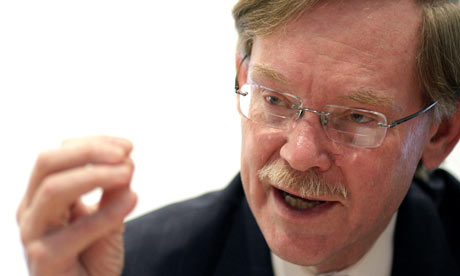- guardian.co.uk, Friday 13 March 2009 15.41 GMT
-
 larger | smaller
larger | smaller - Article history

World Bank president Robert Zoellick. Photograph: Shaun Curry/AFP/Getty Images
The president of the World Bank, Robert Zoellick, warned bickering leaders of the G20 countries that they risked "doing too little, too late" to repair the global economy as finance ministers arrived in Britain for weekend talks.
Amid signs of deep splits between the United States and Europe on how to respond to the most widespread crisis of market economies since the second world war, Zoellick said that cleaning up banking systems was more important than pumping up growth through tax cuts or spending increases.
"Stimulus packages alone are not enough," the World Bank president said. "The International Monetary Fund research of some 122 financial and economic crises shows that turnaround can't happen unless you clean up the bad assets and recapitalise the banks."
Zoellick has forecast the world economy will shrink by 1-2% this year, and added that difficulties could extend "well into 2010". He said today: "If you don't take on the banking issue, the stimulus is just like a sugar high. It pushes some energy into the system but then you get the letdown unless you reopen the credit markets."
Zoellick's comments were echoed by Alistair Darling, who said today that leading nations had to act together to solve the "frustratingly slow" progress in repairing the world's banking system. The chancellor will host the talks between finance ministers designed to lay the foundations of an agreement between heads of government when they meet in London early next month, and he insisted yesterday that banking reform was high on the agenda.
"We've got 80% of the world's economy sitting around one table, first this weekend and in a couple of weeks' time in London," Darling said. "We have the opportunity to demonstrate that we not only understand what needs to be done but we actually get on and do it."
He added that most countries now accepted that action was needed but there was no unanimity about the necessary reforms. "I think, in relation to the banking system, it is frustratingly slow the progress in sorting that out. What we really need is commitment from people.
"You can't just leave the banks. What you've got to do is to make sure you go as fast as you possibly can and try to isolate the problems in the banking system and to get them going again," Darling added.
The chancellor is hopeful that this weekend's talks will agree to provide extra funds to allow the IMF to offer support to struggling emerging economies, but even as he spoke cracks were already showing in the G20's show of international unity.
European countries are frustrated at the determination of Washington to concentrate on short-term measures to boost growth rather than undertake a radical overhaul of financial institutions, including hedge funds, private equity firms and banks.
Timothy Geithner, US treasury secretary, has stressed the need for other leading countries to commit to substantial and sustained efforts to bolster their economies as the recession deepens.
While several other countries support calls for more fiscal stimulus, they want that effort to go hand in hand with reform of the international regulatory system. Wary of piling up huge levels of debt, they do not plan any new stimulus until they see how current plans are working‚ and they might not see results from those until next year, EU officials said this week.
Germany's finance minister, Peer Steinbrück, has been the most outspoken, expressing displeasure at US comments that Europe has not done enough to stimulate the economy.
Anti-poverty campaigners, meanwhile, said the debt burden for the world's 38 poorest nations would be increased by Gordon Brown's plan for a new $250m (£180m) World Bank vulnerability fund.
The Jubilee Debt Campaign said that $270bn needed to be cancelled in order to allow low-income nations to fight poverty, and that the prime minister's plan would result in countries taking on new debts with harmful conditions attached.
"This is a wake-up call to anyone who believes that the 'third world debt crisis' has been solved. The failure of the west to learn the lessons of that crisis, which in many ways mirrors the financial crisis the whole world is now experiencing, means that many countries are still suffering from debts arising from reckless lending 30 years ago."

No comments:
Post a Comment